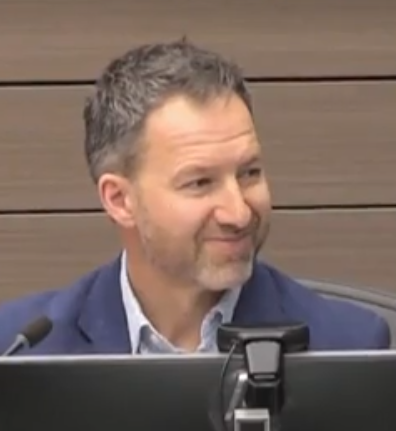 By Staff
By Staff
December 1, 2022
BURLINGTON, ON
The following is the Integrity Commissioners disposition of a complaint made by Tom Muir against Councillor Kelvin Galbraith
Mr. Muir,
Re: Conflict of Interest Complaint against Councillor Kelvin Galbraith
We are writing in response to your complaint to us filed on October 25, 2022. You have complained that Councillor Galbraith had, on multiple occasions, participated in consideration of certain planning matters before Council and its committees while in a conflict of interest contrary to the Municipal Conflict of Interest Act (the ‘MCIA’). You have asserted that the interest arose because of four non-residential properties he owns, and have alleged as a result that the Councillor breached the MCIA.
The allegations particularized in your complaint can be summarized as follows:
- during 2018, you specifically asked the Councillor how he would manage his potential interest (his ‘conflict of interest’) because of his ownership of several properties located within the Aldershot/GO MTSA area
- the Councillor advised that he would seek guidance and advice from the Integrity Commissioner as required
- in March 2019, the Councillor failed to declare an interest with respect to the Interim Control By-Law for the Burlington GO Station Study Area and opposed that By-law
- between 2019 – 2022, the Councillor failed to declare an interest with respect to four separate planning applications for properties located with the MTSA, where development approvals on these properties would potentially influence future development decisions within the MTSA, and thus affect the Councillor’s other properties in the area
- between 2019 – 2021 on the numerous occasions when the Councillor did declare an interest with respect to planning applications for properties within the Aldershot GO/MTSA, he only referenced proximity to his personal residence as the basis for his interest, and failed to identify that ownership of multiple properties within the MTSA which also gave rise to an interest
- in declaring his interest, the Councillor characterized the nature of his interest as based on “proximity”, rather than identifying it as a pecuniary interest

Kelvin Galbraith being sworn in for his second term of office
As part of our review process, and in accordance with the tenets of procedural fairness, we forwarded your complaint to the Councillor for his response. We have now had an opportunity to obtain and review that response and your additional submissions and supplementary materials. We have conducted a detailed review of materials, Council minutes and archived meetings, the City’s Conflict Registry, and other relevant documentation.
Background:
In the circumstances of Councillor Galbraith, the 3 properties he owns (aside from his own residence) are adjacent and abutting, at the northwest corner of Plains Rd. West and Waterdown Rd. The Councillor has declared an interest each time there has been a planning matter before Council or its committees involving a property within 120 m of his residence and each time a planning matter involved a property located within 120 m of any of his Plains Rd. or Waterdown Rd. properties.
He did not declare an interest on planning matters before Council or its committees involving properties within the general vicinity in the Aldershot GO/MTSA area but beyond 120 m. of his properties
In February 2022 the Councillor sought our advice regarding managing perceived interests created by his ownership of the Plains Rd./Waterdown Rd. properties. Our advice can be summarized as follows:
- if a matter before Council may potentially impact the Councillor’s property, this raises a pecuniary interest; the planning notice distance of 120 m can be used as a proxy (a rule of thumb) for when this interest arises
- in the context of the Aldershot GO/MTSA discussions, in which the Councillor owns properties, a potential conflict of interest is triggered when proposed changes in land use come before Council which could affect the potential redevelopment of these properties
Analysis
While our analysis focuses on the MCIA provisions, we note that the Burlington Code of Good Governance quite properly also mandates Members to avoid conflicts of interest. Therefore, even though your complaint was filed beyond the 6-week statutory deadline under the MCIA, we have considered the matter in a robust and comprehensive manner, recognizing that conflicts of interest are appropriately prohibited by the Code. Given the recent public attention generated by this particular matter, it was important to give the matter due consideration and full explanation.
The relevant provision of the MCIA states as follows:
- (1) Where a member … has any pecuniary interest … in any matter and is present at a meeting of the council … at which the matter is the subject of consideration, the member,
- shall, prior to any consideration of the matter at the meeting, disclose the interest and the general nature thereof;
- shall not take part in the discussion of, or vote on any question in respect of the matter; and
- shall not attempt in any way whether before, during or after the meeting to influence the voting on any such question.
A pecuniary interest, although not defined, is understood to mean a financial impact. Any matter which has likely financial impact (positive or negative) on the Member’s own property constitutes a pecuniary interest to the Member.
The MCIA does not provide guidance on how to recognize an interest arising on planning applications in relation to the Member’s own properties. Each conflict of interest must be assessed on its own merits, and such assessment requires a close review of the facts. There is a significant body of case law which guides Integrity Commissioners on the proper interpretation.
One of the leading cases dealing with recognizing a pecuniary interest in circumstances of property ownership is Greene and Borins1.
Greene and Borins references the Planning Act notice distance of 120 m as a proxy for potential financial impacts on a Member’s property interest. In that case, the court found that where the Member’s father and family had been assembling properties for some years, in anticipation of redevelopment (along Yonge Street in North York), the Member’s participation on large and comprehensive development proposals in the vicinity – even beyond 120 m – triggered a conflict of interest for the Member for which he failed to obtain advice and failed to declare an interest.
The 120 m distance is somewhat arbitrary and although it is relied on as a ‘rule of thumb’, much depends on the particular facts of a situation: certainly, where a Member has a significant investment in a land assembly awaiting redevelopment (as in Greene and Borins), the potential affect of a large and comprehensive development application must be considered to extend beyond 120 m.
In Greene and Borins, the closest of the Member’s father’s properties to the developments proposed before Council was 220 m. The nine (9) properties acquired over the preceding years stood to be significantly impacted by redevelopment of the adjacent Yonge Street corridor.
By contrast, with respect to Councillor Galbraith’s three properties, one which is his fitness business, the distances to the planning applications in which he participated are well beyond 120 m and beyond the 220 m. which the court found significant in Greene and Borins:
40-70 Plains Rd. 240 m
53-71 Plains Rd. 350 m
92 Plains Rd.W. 450 m
1120 Cooke Blvd. 650 m
In our view, the Councillor did not breach the MCIA in participating on consideration of these planning applications. In our opinion, he did not have a conflict of interest merely because the
1 Greene v. Borins (1985), 1985 CanLII 2137 (ON SC), 50 O.R. (2d) 513, 18 D.L.R. (4th)
planning applications pertain to properties within the MTSA. As we advised, where matters before Council or committees pertain to changes of land use affecting his own properties (such as changes to land use designations applicable to his properties), his interest will be triggered. The planning applications in which he participated do not trigger his interest because Council’s decision regarding those applications does not, in and of itself, affect his own properties.
We also find that, though individual planning applications in the general vicinity might cumulatively encourage increased redevelopment in the area, individually, no single one of these planning applications raised a conflict of interest for the Member merely because he owns properties in the general vicinity. They are not sufficiently proximate to his properties to trigger his interest.
With respect to the Interim Control By-law for the Burlington GO Study Area, there was no conflict of interest when the Member participated in this matter. None of his properties are located within this study area. You have provided supplementary material to indicate that the Member’s failure to bring a motion (or indicate support for a motion) to extend the Interim Control By-law to include the Aldershot GO/MTSA is evidence of further conflict of interest. Given that no such motion was made, it is merely speculative. That said, in our view, the effect of such a motion being to pause all planning applications on every property within a large defined area, and given that no applications by the Member on any of his properties were in the works and ‘paused’ by such theoretical Interim Control By-law, it would be reasonable to consider the Member’s interest (in such circumstances) to be an interest in common, in which case he would not be precluded from participating.

Kelvin Galbraith
You have raised concerns alleging that the Member has not conducted himself with transparency. It is important to recognize that Members are not required to report to constituents when they have consulted with Integrity Commissioner or obtained advice, nor are they required to share advice provided. The Municipal Act encourages Members to obtain advice, and provides the assurance of confidentiality around that communications. The sole exception to that confidentiality occurs if a Member releases part of the advice, but not the advice in its entirety, in which case the Integrity Commissioner may release the advice.
We are satisfied that the Member conducted himself with integrity, sought advice when required, followed that advice, and in fact released a copy of our advice to him in its entirety.
Accordingly, we will be closing our file. Our disposition will be shared with the Member. Thank you nevertheless for bringing this matter to our attention.
Sincerely,
Principles Integrity,
Integrity Commissioner for the City of Burlington



















This is the second posting of my comment. The first attempt must have gone into the ether and I know how irritating it is for the Editor to have to hunt for readers’ “pearls of wisdom”.
For what it’s worth, and entirely my opinion, this judgement is flawed. While precedent and case history are significant they are, as noted, ‘rules of thumb’ and are merely guidelines for reaching a fair and appropriate decision. Here, location is everything. Plains Road is the commercial artery of Aldershot and any businesses in that area will benefit from a directed intensification, regardless of actual proximity.
That said, I believe that the larger issue is the relationship of the Integrity Commissioner to the City of Burlington client; a paid, fee-for-service agent that is really not ‘arms length’ however impartial. In 2018/19, a number of us advocated against Regional Amalgamation in the belief that it was critical to preserve and protect local voice. However, at the time, we also identified a number of services and functions that would, in fact, benefit from aggregation at the Regional level; such things as information technology, purchasing, fleet management and transportation services. Added to this should be governance and compliance services such as internal audit, integrity reviews, WDHP investigations and closed meeting examinations. The organizational subject of these workplace environment investigations, focusing on compliance, performance and operational probity, should not be ‘paying the investigator/piper’. This is a ‘de facto’ conflict in my opinion, cutting both ways.
As an aside, were Regional Amalgamation to raise its head again in an intelligent form, I would take a far different position than before. In my opinion, local voice is a myth; a campaign mantra not subsequently heard or heeded in Burlington, the “mistake by the Lake” where “open government” is merely a catch phrase.
“Analysis
While our analysis focuses on the MCIA provisions, we note that the Burlington Code of Good Governance quite properly also mandates Members to avoid conflicts of interest. Therefore, even though your complaint was filed beyond the 6-week statutory deadline under the MCIA, we have considered the matter in a robust and comprehensive manner, recognizing that conflicts of interest are appropriately prohibited by the Code. Given the recent public attention generated by this particular matter, it was important to give the matter due consideration and full explanation.’
I find this very interesting….basically the only reason they have “considered the matter in a a robust and comprehensive manner etc. was because of “the recent public attention generated etc. etc”
What does this say about a process that has been put in place to provide residents the ability to challenge the actions of their elected council members? Does their statement mean that if this issue had not been made public no report would have taken place?
We know that the city hires and pays for the law firm who acts as the Integrity Commissioner. We also know that there is no term limit, which means these firms can be rehired council term after council term. This is presently the situation in Burlington.
Some of the “public attention” came from some council members who declared Councillor Galbraith had no conflict of interest prior to the Integrity Commissioner’s Report. How could they know this?
How independent is this process?
Let’s not forget that the Integrity Commissioner’s report is simply recommendations. Council can choose to ignore or bury a report should they wish.
I think it is time for residents to ask for changes.
Penny as usual you have captured the key points of concern as has Blair Smith. It is interesting that Blair after a four year term of a MMW mayor is now seeing things differently in terms of local voice. The Region Review turned out to be a huge farce as far as we are concerned. We brought all sorts of issues to that review none of which were addressed that could have made a huge difference in how the Region and City operate today, particularly with regard to the Region’s handling of infectious disease outbreaks well before COVID.
Why not focus on real issues as opposed to digging for cheap unfounded dirt?
Editor’s note: Your opinion is appreciated. Would you set out for us two or three “real issues” for us to focus on?
For what it’s worth, and entirely my opinion, this judgement is flawed. While precedent and case history are significant they are, as noted, ‘rules of thumb’ and are merely guidelines for reaching a fair and appropriate decision. Here, location is everything. Plains Road is the commercial artery of Aldershot and any businesses in that area will benefit from a directed intensification, regardless of actual proximity.
That said, I believe that the larger issue is the relationship of the Integrity Commissioner to the City of Burlington client; a paid, fee-for-service agent that is really not ‘arms length’ however impartial. In 2018/19, a number of us advocated against Regional Amalgamation in the belief that it was critical to preserve and protect local voice. However, at the time, we also identified a number of services and functions that would, in fact, benefit from aggregation at the Regional level; such things as information technology, purchasing, fleet management and transportation services. Added to this should be governance and compliance services such as internal audit, integrity reviews, WDHP investigations and closed meeting examinations. The organizational subject of these workplace environment investigations, focusing on compliance, performance and operational probity, should not be ‘paying the investigator/piper’. This is a ‘de facto’ conflict in my opinion, cutting both ways.
As an aside, were Regional Amalgamation raise its head again, I would take a far different position. In my opinion, local voice is not heard or heeded in Burlington and “open government” is merely a catch phrase.